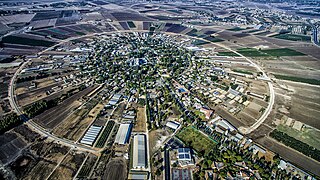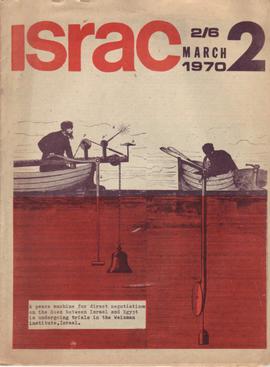Related Research Articles

Zionist political violence refers to acts of violence or terrorism committed by Zionists in support of establishing and maintaining a Jewish state in Palestine. These actions have been carried out by individuals, paramilitary groups, and the Israeli government, from the early 20th century to the present day, as part of the ongoing Israeli-Palestinian conflict.
During the 1948 Palestine war, massacres and acts of terror were conducted by and against both sides. A campaign of massacres and violence against the Arab population, such as occurred at Lydda and Ramle and the Battle of Haifa, led to the expulsion and flight of over 700,000 Palestinians, with most of their urban areas being depopulated and destroyed. This violence and dispossession of the Palestinians is known today as the Nakba.

Plan Dalet was a Zionist military plan executed during the 1948 Palestine war for the conquest of territory in Mandatory Palestine in preparation for the establishment of a Jewish state. The plan was the blueprint for Israel's military operations starting in March 1948 until the end of the war in early 1949, and so played a central role in the 1948 Palestinian expulsion and flight known as the Nakba.

Al-Khisas, also known as Khisas or Khissas, was a Palestinian Arab village in the Safad Subdistrict in Mandatory Palestine. It was located 31 kilometers (19 mi) northeast of Safed on a natural terrace about 100 meters (330 ft) wide that formed when Lake al-Hula receded. To the west of the village was a valley known as Wadi al-Hasibani through which ran the Hasbani River.

The Battle of Haifa, also known as the Fall of Haifa, and called by the Jewish forces Operation Bi'ur Hametz, was a Haganah operation carried out on 21–22 April 1948 and a major event in the final stages of the civil war in Palestine, leading up to the 1948 Arab-Israeli War. The objective of the operation was the capture of the Arab neighborhoods of Haifa. The operation formed part of the 1948 Palestinian expulsion and flight, with approximately 15,000 Arab residents being displaced between April 21–22, and with only 4,000 remaining in the city by mid-May from a pre-conflict population of approximately 65,000.

Nahalal is a moshav in northern Israel. Covering 8.5 square kilometers (3.3 sq mi), it falls under the jurisdiction of the Jezreel Valley Regional Council. In 2022 it had a population of 1,351.

Caesarea, also transliterated as Keisarya or Qaysaria, is an affluent resort town in north-central Israel, which was named after the ancient city of Caesarea Maritima situated 1–2 kilometres (0.62–1.24 mi) to the south in the adjacent Caesarea National Park.

Al-Shaykh Muwannis, also Sheikh Munis, was a small Palestinian Arab village in the Jaffa Subdistrict of Mandatory Palestine, located approximately 8.5 kilometers from the center of Jaffa city in territory earmarked for Jewish statehood under the UN Partition Plan. The village was abandoned in March 1948 due to the threats of Jewish militias, two months before the 1948 Arab–Israeli war. Today, Tel Aviv University lies on part of the village land.
During the 1948 Palestine war in which the State of Israel was established, around 700,000 Palestinian Arabs, or 85% of the total population of the territory Israel captured, were expelled or fled from their homes. The causes of this mass displacement have been a matter of dispute, though today most scholars consider that the majority of Palestinians were directly expelled or else fled due to fear.

Tantura was a Palestinian Arab fishing village located 8 kilometers (5 mi) northwest of Zikhron Ya'akov on the Mediterranean coast of Israel. Near the village lie the ruins of the ancient Phoenician city of Dor.

The Deir Yassin massacre took place on April 9, 1948, when Zionist paramilitaries attacked the village of Deir Yassin near Jerusalem, Mandatory Palestine, killing at least 107 Palestinian villagers, including women and children. The attack was conducted primarily by the Irgun and Lehi, who were supported by the Haganah and Palmach. The massacre was carried out despite the village having agreed to a non-aggression pact. It occurred during the 1947–1948 civil war and was a central component of the Nakba and the 1948 Palestinian expulsion and flight.

Ezra Danin was the head of the Arab section of the SHAI, the intelligence arm of the Haganah, Israeli politician and an orange grower. Danin specialized in Arab affairs.
Operation Hametz was a Zionist operation towards the end of Mandatory Palestine, as part of the 1948 Palestine war. It was launched at the end of April 1948 with the objective of capturing villages inland from Jaffa and establishing a blockade around the town. The operation, which led to the first direct battle between the British and the Irgun, was seen as a great victory for the latter, and enabled the Irgun to take credit for the complete conquest of Jaffa that happened on May 13.
In the 1948 Palestine war, more than 700,000 Palestinian Arabs – about half of Mandatory Palestine's predominantly Arab population – were expelled or fled from their homes, at first by Zionist paramilitaries, and after the establishment of Israel, by its military. The expulsion and flight was a central component of the fracturing, dispossession, and displacement of Palestinian society, known as the Nakba. Dozens of massacres targeting Arabs were conducted by Israeli military forces and between 400 and 600 Palestinian villages were destroyed. Village wells were poisoned in a biological warfare programme codenamed Operation Cast Thy Bread and properties were looted to prevent Palestinian refugees from returning. Other sites were subject to Hebraization of Palestinian place names.

Events in the year 1947 in the British Mandate of Palestine.

The Ethnic Cleansing of Palestine is a book authored by New Historian Ilan Pappé and published in 2006 by Oneworld Publications. The book is about the 1948 Palestinian expulsion and flight, which Pappe argues was the result of ethnic cleansing.
Moshé Machover is a mathematician, philosopher, and socialist activist, noted for his writings against Zionism. Born to a Jewish family in Tel Aviv, then part of the British Mandate of Palestine, Machover moved to Britain in 1968 where he became a naturalised citizen. He was a founder of Matzpen, the Israeli Socialist Organisation, in 1962.

Matzpen is the name of a revolutionary socialist and anti-Zionist organisation, founded in Israel in 1962 which was active until the 1980s. Its official name was the Socialist Organisation in Israel, but it became better known as Matzpen after its monthly publication.
Akiva "Aki" Orr was an Israeli writer and political activist. He was an outspoken critic of Zionism and supported a one-state solution to the Israeli–Palestinian conflict. After 1968 Orr was a leading advocate of radical direct democracy.

The Nakba is the ethnic cleansing of Palestinian Arabs through their violent displacement and dispossession of land, property, and belongings, along with the destruction of their society and the suppression of their culture, identity, political rights, and national aspirations. The term is used to describe the events of the 1948 Palestine war in Mandatory Palestine as well as the ongoing persecution and displacement of Palestinians by Israel. As a whole, it covers the fracturing of Palestinian society and the long-running rejection of the right of return for Palestinian refugees and their descendants.
References
- 1 2 3 4 5 6 Akiva Orr (13 March 2007). "Homage to Nissan Rilov (1918 - 2007)" (PDF). The Region. Retrieved 2007-12-09.
- ↑ Rajsfus, Maurice (1987). Retours d'Israël, p. 289. L'Harmattan. ISBN 2858028613
- 1 2 "Nissan Rilov". Israel Museum Information Center for Israeli Art. Retrieved 11 March 2012.
- ↑ "Morsains / L'association Lumières se fait connaître Pleins feux sur le théâtre". l'union. 17 January 2010. Retrieved 11 March 2012.
- ↑ "Au hameau de Leuze / 2e édition du festival de théâtre". l'union. 8 July 2011. Retrieved 11 March 2012.
- ↑ Faycal Falaky (200). "The Oppressive Victim". G21:The World's Magazine. Retrieved 2007-12-09.
- ↑ Passevant, Christiane (15 March 2010). "Michal Schwartz. La lutte dans la vie". Divergences(in French)